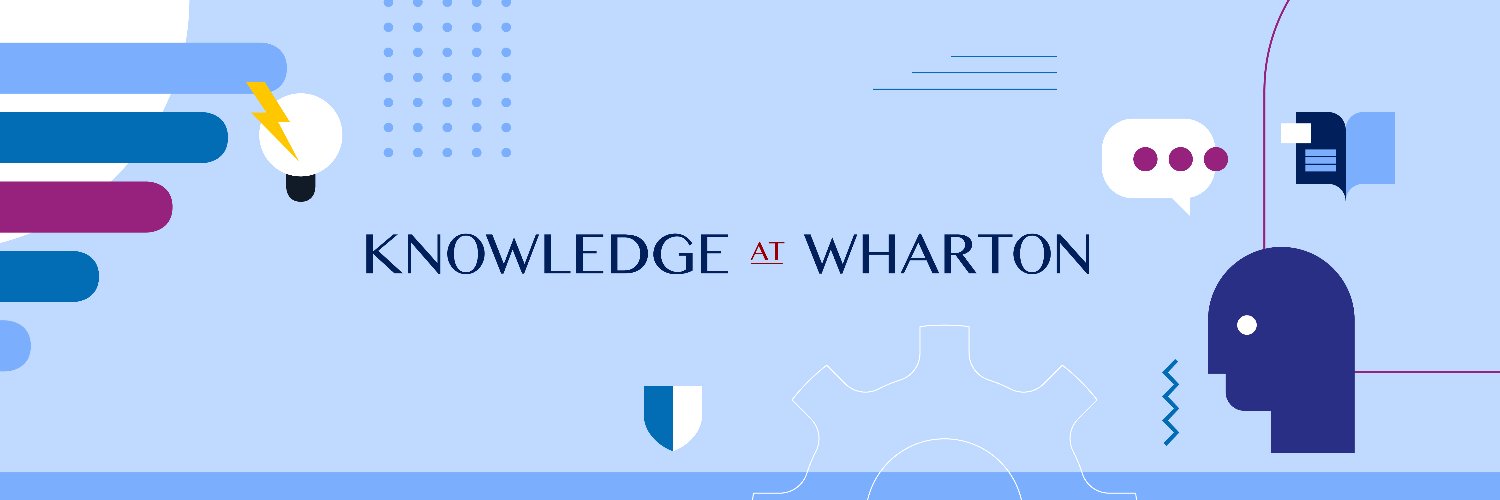
Knowledge at Wharton
@whartonknows
The online business analysis journal of the @Wharton School of @Penn, sharing Wharton's intellectual capital with the world since 1999.
📝 Continuing our "Research Doodles" series with @MarissaShandell 📝 While tooting your own horn at work is important, including others when sharing your accomplishments is more effective, according to research co-authored by @Wharton's @ME_Schweitzer: whr.tn/40ksHve

AI is reshaping creativity by combining machine-generated insights with human judgment. @Wharton's Cornelia Walther explains how businesses can foster “hybrid creativity” by building workflows & cultures that integrate human-AI collaboration effectively: whr.tn/44mLWbg

This #WhartonExecEd Nano Tool examines the subtle effects of appearing first or last among options – and the situations in which each place is most advantageous when making decisions: whr.tn/46nsfSh 📝: @ME_Schweitzer (@Wharton) & @AdamGalinsky (@Columbia_Biz)

What keeps people hooked on maintaining their Duolingo streaks? @Wharton's Marissa Sharif found that "streak rewards," or growing rewards for consistent behaviors, increase commitment toward achieving a goal. Find out more on our Ripple Effect podcast: whr.tn/417lCQh
How will the recently passed reconciliation bill impact the economy? @Wharton professor Kent Smetters joined our "This Week in Business" podcast to break down the @BudgetModel's projections for the national debt, GDP, and households: whr.tn/44UUepV
What leads some people to refuse to back down even after defeat? @Wharton's @HenningPiezunka found two key factors in his study of Formula One races – and explains how leaders in the workplace must manage rivalries to keep competition productive: whr.tn/44UuAmj

When employees feel threatened by AI tools, they won't all react the same way. To kick off our Ripple Effect podcast's three-part "Research Roundup" series, @Wharton's Stefano Puntoni explains the five common responses he expects based on his research: whr.tn/3GJ6O3v
How is AI impacting the way we view work? What incentives can help us stick to goals? Why do teams misread each other’s priorities? The next three Tuesdays, our new Ripple Effect podcast series explores the latest @Wharton research into the workplace: whr.tn/rippleeffect

🎙️ Introducing This Week in Business! 🎙️ Keep up with the latest news impacting the business world through our weekly podcast, featuring interviews with @Wharton experts. Subscribe wherever you get your podcasts for new episodes on Wednesdays & Fridays: whr.tn/twib
How do you invest for both return and impact? On the final episode of our Ripple Effect podcast's "Meet the Authors" series, @Wharton's Tyler Wry and Katherine Klein share insights from their new book, "An Introduction to Early-Stage Impact Investing": whr.tn/3IiRyeg
How has AI changed freelance work? New research from @Wharton's Manav Raj & Shun Yiu and @NYUStern's @RobSeamans shows how ChatGPT upended the online labor market by quietly and dramatically altering how workers carry out tasks and compete for jobs: whr.tn/4lbOL57

Research from @Wharton finance Prof. Martin Souchier develops a model where “optimal wage contracts” can provide workers “insurance” within a firm to reduce wage volatility, and insurance outside the firm with the ability to borrow in financial markets. whr.tn/4euiROx

How should future generations be preparing to stay relevant in the workforce with the rise of AI? @KhanAcademy CEO Sal Khan shared his thoughts on the debut episode of @Wharton professor @KHosanagar's new @WhartonAIAI podcast, "Creative Intelligence." 🎧: whr.tn/4nCcX28
In the era of distraction, how can marketers capture and hold their audiences' attention? @Wharton's Elizabeth Johnson & @BarbaraKahn discuss their new book, "Visual Marketing," in the latest episode of our Ripple Effect podcast's Meet the Authors series: whr.tn/3GgYeZC
When AI is at fault, who is accountable? @Wharton's Cornelia Walther outlines how accountability must be built into the full life cycle of AI through the M4-Matrix framework, guiding organizations to design for resilience, transparency, and trust: whr.tn/3HZv55L

Developed in partnership with the @BudgetModel, this @WashingtonPost calculator can help evaluate how "The One Big Beautiful Bill" impacts your finances: whr.tn/3TcSyTd “The bill creates a fair amount of new debt, and somebody has to pay for that," says @KentOnMoney.

Virtual influencers – AI-generated avatars with fan bases – can rival or even outperform humans, @Wharton's @J1Berger found: whr.tn/3T6IhIj When virtual influencers are shown with realistic-looking people, audiences trust them more because they seem more authentic.
Banking risk in the US is shaped by behind-the-scenes judgment calls by regulators & financial institutions, explains @Wharton's Peter Conti-Brown. He joins our Ripple Effect podcast's authors series to discuss his new book, Private Finance, Public Power: whr.tn/4l1WJh8
Americans' trust in science is at its lowest point in nearly 50 years. Neuroscientists @MichaelLouisPl1 (@Wharton) and @CoryMillerMarmo (@UCSanDiego) argue that scientists need a new playbook, prioritizing communication, public engagement, and inclusion: whr.tn/4l9Ee9X

Food delivery apps like DoorDash and Uber Eats offer consumers convenience, but for many restaurants, they’re a growing threat. @Wharton's Manav Raj finds that they thin profit margins and require increased efficiencies from restaurants to survive: whr.tn/4jSz7tV
